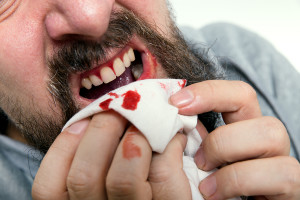 For many people, finding out that they have gum disease only happens after an examination, when the dentist finally announces the diagnosis. But gum disease unlike many illnesses, isn’t a strictly internal affliction that can only be spotted by a professional using the latest equipment.
For many people, finding out that they have gum disease only happens after an examination, when the dentist finally announces the diagnosis. But gum disease unlike many illnesses, isn’t a strictly internal affliction that can only be spotted by a professional using the latest equipment.
Gum disease, and the onset of it, can actually be spotted early if you know what to look for. Of course, if you’re taking care of your teeth with regular brushing and flossing, this reduces the risk drastically, but even diligent oral care is no guarantee of 100% protection. Gum disease, despite oral care, can still happen for a variety of reasons—such as if you’re a smoker or diabetic—but here are a few of the things you can keep in mind when you examine your own mouth.
Chronic bad breath can be one indicator of gum disease. It’s not unusual for people to have bad breath, especially in the morning, but if it persists even after brushing teeth and using mouth wash, there’s a chance that it’s related to a high amount of bacteria in your mouth.
Swollen or red gums is another symptom to keep an eye out for. Your gums will always have a natural red-to-pink color depending on the individual, but if you notice a change in color, and you see—and feel—that the swelling is beyond what’s normal for you, this is another possible sign that your gums may be infected.
Loose or sensitive teeth is another sign. If you notice one day that an individual tooth is feeling a little “wobbly,” or even chewing down on something causes a pain in your mouth that doesn’t usually happen this is a warning that you want to get checked.
And of course, regular bleeding is the most common, visible sign of a problem with your gums. Quite often if your body detects an infection in your mouth, the response to fight it off, which means it attempts to grow more blood vessels in your mouth to get more anti-bodies to the area of infection. This can result in more bleeding and if it happens regularly, you should think about having your mouth examined.


